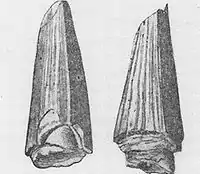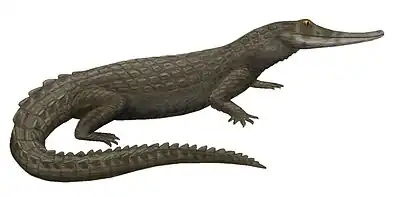| Pliogonodon Temporal range: Late Cretaceous | |
|---|---|
 | |
| Illustration of type specimen, 1858 | |
| Scientific classification | |
| Kingdom: | |
| Phylum: | |
| Class: | |
| (unranked): | |
| Order: | |
| (unranked): | |
| Family: | |
| Genus: | Pliogonodon |
| Species | |
| |
Pliogonodon is an extinct genus of crocodylomorph. The type species, P. priscus, was named by Joseph Leidy in 1856. The holotype, known as USNM 7448, is a worn and broken tooth found from Phoebus Landing on the Cape Fear River in North Carolina.[1] Although the age of the strata in which the tooth was found was not recorded, it is thought to have come from Miocene-age beds.[2] The holotype and another tooth found at the same location are all that is known from the genus. The genus is considered a nomen dubium because of the lack of diagnostic features possessed by the teeth, and has been suggested to be synonymous with the alligatoroid Deinosuchus.[3] Although Carroll (1988) assigned the genus to the basal neosuchian family Goniopholididae,[4] current consensus is that Pligonodon is a Deinosuchus specimen.[5]
The two teeth are conical and curve slightly inward, estimated to be around 2 inches (5.1 cm) in length if they had been fully preserved. The enamel is wrinkled and the base of the crowns are hollow.[2]
References
- ↑ Miller, H. W. (1967). "Cretaceous Vertebrates from Phoebus Landing, North Carolina". Proceedings of the Academy of Natural Sciences of Philadelphia. 119 (1967): 219–239.
- 1 2 Mook, C. C. (1925). "A revision of the Mesozoic Crocodilia of North America". Bulletin of the American Museum of Natural History. 51: 319–432.
- ↑ "Deinosuchus". Paleofile. Retrieved 2009-12-09.
- ↑ Carroll, R. L. (1988). Vertebrate Paleontology and Evolution. New York: W. H. Freeman and Company. pp. 1–698. ISBN 9780716718222.
- ↑ http://www.elasmo.com/frameMe.html?file=paleo/blkcrk/nc_cret.html&menu=bin/menu_fauna-alt.html
External links
- Pliogonodon in the Paleobiology Database


